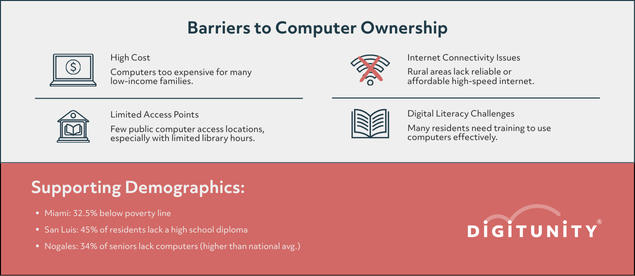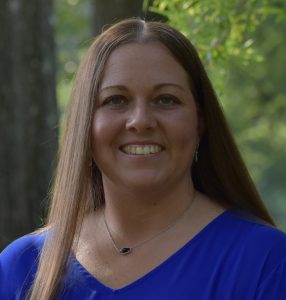Tens of thousands of Arizona households struggle every day without access to a personal computer, making do with smartphones or limited public access to access the world. In some rural towns, as many as one in three homes do not have access to a large-screen computer, disconnecting families from valuable opportunities in education, employment, health, and citizenship.
Digitunity’s newest case study, developed in partnership with Chicanos Por La Causa and supported by AT&T, explores this issue in depth. Through focus groups, field data, and a device deployment initiative in San Luis and Miami, the report documents the real barriers residents face and the community-driven solutions emerging in response.
What we learned supports the reality we’ve observed in communities through our extensive rural work. By collaborating, local institutions, public institutions, and residents can create the infrastructure and support needed to make it possible for everyone to own a computer.

The case study reveals:
- Personal experiences of those living daily life without an individual computer
- Statistics regarding computer ownership disparities in cities such as Superior, Nogales, San Luis, and Miami
- The contribution of credible local institutions to supporting training, access, and sustained use
- Actionable strategies that can inform other rural digital access initiatives
This report draws on Digitunity’s broader rural initiatives, including our recent Mississippi Case Study, and Rural Communities & Digital Device Ownership, a 2022 report authored by Dr. Brian Whitacre. A follow-up to that report is currently in development and expected to be released in the coming months. Collectively, these efforts deepen our understanding of what’s required to advance locally grounded approaches to expanding access to technology where the need is greatest.
Digitunity is a national nonprofit organization with a mission to make owning a computer possible for everyone. Engaged in advancing digital opportunity for over 40 years, Digitunity generates and places donated computers with organizations serving people in need, supports a national practitioner network, and advises states, cities, and coalitions on strategies to meet the ongoing device needs of people impacted by the digital divide.


